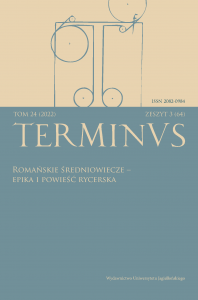Flamenca i Radość Gry w świecie trubadurów
Flamenca and the Joy of Play in the World of the Troubadours
Author(s): Michał Artur Sawczuk-SzadkowskiSubject(s): Other Language Literature
Published by: Wydawnictwo Uniwersytetu Jagiellońskiego
Keywords: Flamenca; troubadours; Occitan literature; courtly literature; game; play;
Summary/Abstract: This article attempts to interpret a thirteenth-century Occitan chivalric romance, Le roman de Flamenca, in the context of game and play. Play is an important element of the troubadours’ sociopoetic culture, both in its social (fin’amor) and literary (trobar) aspects. Since the author considers Flamenca to be a work that summarises the history of Occitan courtly poetry, on this basis he puts forward the hypothesis that the plot of the text in question was also constructed by games. This hypothesis is proven by analysing the romance through the prism of Johan Huizinga’s and Roger Caillois’ concept of play. An additional argument testifying to the importance of games in the troubadour world is the key term for fin’amor, joi (translated as Joy), whose components are two other terms: joia (joy) and joc (game). For this reason, the author treats this phenomenon as the Joy of Play, a feeling of pleasure resulting from engagement in poetic games. Based on Caillois’ classification, the author distinguishes two types of games in the text. The first of these is agon, or the competition between Flamenca and her lover Guillaume, and her jealous husband Archambaut. The analysis of the work provides answers to questions about the model player, the set of rules of the game (referred to as lo gay saber, ‘the gay science’) and its course. Of particular note are the passages in which competition is thematised through ludic vocabulary and references to joi. This leads to the conclusion that agon is a structural principle of Le roman de Flamenca. The next section aims to interpret the plot of the novel in the context of mimicry, games based on imitation. The theatrical motifs of the work are subjected to critical reflection, particularly in connection with the joi. In this sense, illusion and imitation constitute the content of the work. In the last section, the author proposes to raise the question about other forms of games in the troubadour world. In particular, the treatment of joi as illinx, a game based on vertigo, is taken into consideration. The collected material and the research lead to the conclusion that Flamenca is a piece built around different types of games: agon is its structure, mimicry serves to guide the action, while illinx may be its possible goal.
Journal: TERMINUS
- Issue Year: 24/2022
- Issue No: 3 (64)
- Page Range: 259-286
- Page Count: 28
- Language: Polish

